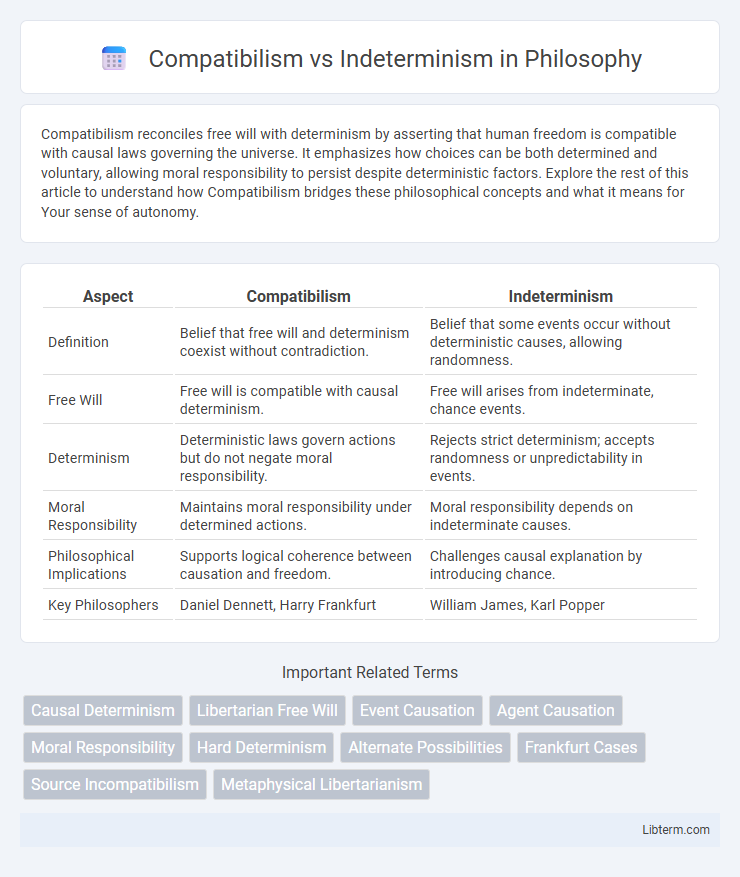Compatibilism reconciles free will with determinism by asserting that human freedom is compatible with causal laws governing the universe. It emphasizes how choices can be both determined and voluntary, allowing moral responsibility to persist despite deterministic factors. Explore the rest of this article to understand how Compatibilism bridges these philosophical concepts and what it means for Your sense of autonomy.
Table of Comparison
| Aspect | Compatibilism | Indeterminism |
|---|---|---|
| Definition | Belief that free will and determinism coexist without contradiction. | Belief that some events occur without deterministic causes, allowing randomness. |
| Free Will | Free will is compatible with causal determinism. | Free will arises from indeterminate, chance events. |
| Determinism | Deterministic laws govern actions but do not negate moral responsibility. | Rejects strict determinism; accepts randomness or unpredictability in events. |
| Moral Responsibility | Maintains moral responsibility under determined actions. | Moral responsibility depends on indeterminate causes. |
| Philosophical Implications | Supports logical coherence between causation and freedom. | Challenges causal explanation by introducing chance. |
| Key Philosophers | Daniel Dennett, Harry Frankfurt | William James, Karl Popper |
Introduction to Compatibilism and Indeterminism
Compatibilism asserts that free will is compatible with determinism, proposing that individuals can act freely even when their actions are causally determined by prior events. Indeterminism, by contrast, holds that not all events are determined by causes, allowing for genuine randomness or spontaneity in decision-making processes. These differing perspectives shape ongoing philosophical debates about moral responsibility and the nature of human freedom.
Historical Background of Free Will Debates
The historical background of free will debates reveals a profound engagement with Compatibilism and Indeterminism since ancient philosophical traditions. Early thinkers like Aristotle laid foundational concepts by examining human agency and moral responsibility, while Enlightenment philosophers such as David Hume advanced Compatibilist arguments by reconciling determinism with free will through psychological causation. In contrast, Indeterminism gained traction in the 20th century with developments in quantum mechanics and libertarian free will theories, challenging deterministic frameworks by emphasizing randomness and unpredictability in human decision-making.
Defining Compatibilism: Core Concepts
Compatibilism asserts that free will and determinism are compatible, proposing that individuals can be considered free when their actions align with their internal desires and motivations, even if those desires have deterministic origins. This philosophical stance emphasizes the importance of moral responsibility, arguing that freedom is the capacity to act according to one's character without external coercion. Core concepts include the differentiation between conditional freedom and absolute free will, with compatibilists rejecting the necessity of indeterminism for true freedom.
Understanding Indeterminism
Indeterminism posits that not all events are causally determined, allowing for genuine randomness and unpredictability in certain processes. This perspective challenges deterministic frameworks by emphasizing the role of chance and quantum uncertainty in physical and decision-making systems. Understanding indeterminism highlights the complexity of free will debates, as it suggests that some actions may arise without predetermined causes, contrasting with compatibilist views that reconcile free will with determinism.
Key Differences Between Compatibilism and Indeterminism
Compatibilism asserts that free will is compatible with determinism, emphasizing that human actions can be both determined and free when aligned with internal motivations rather than external constraints. Indeterminism, on the other hand, argues that events, including human decisions, are not predetermined and can occur randomly or without causal necessity. The key difference lies in compatibilism's acceptance of causality in free will, whereas indeterminism rejects deterministic causality in explaining human choice.
Philosophical Arguments Supporting Compatibilism
Compatibilism asserts that free will is compatible with determinism, emphasizing that moral responsibility depends on the ability to act according to one's desires without external coercion. Philosophical arguments supporting compatibilism highlight that determinism does not negate the capacity for rational deliberation or personal agency, as seen in the works of philosophers like Daniel Dennett and Harry Frankfurt. These arguments stress that freedom entails acting in line with internal motivations, rather than being the product of indeterminate randomness as proposed by indeterminism.
Objections to Compatibilism
Objections to compatibilism often highlight its perceived redefinition of free will, arguing that it fails to address the fundamental incompatibility between determinism and genuine freedom. Critics emphasize that compatibilism ignores the role of indeterministic events in enabling autonomous choice, suggesting that if all actions are predetermined, moral responsibility becomes questionable. Furthermore, the argument that compatibilism conflates freedom with mere absence of external coercion raises concerns about whether it truly accounts for alternative possibilities in decision-making.
Major Critiques of Indeterminism
Indeterminism faces significant criticism for its reliance on randomness to explain free will, which many argue undermines the notion of responsible agency by introducing unpredictability rather than control. Critics emphasize that indeterministic actions lack the intentional causality necessary for moral accountability, as events occurring without deterministic cause may be arbitrary. This challenges the coherence of indeterminism as a robust framework for explaining human freedom compared to compatibilism's reconciliation of determinism with free will.
Practical Implications in Ethics and Law
Compatibilism supports ethical responsibility by asserting that free will aligns with deterministic laws, enabling accountability in legal systems. Indeterminism challenges this by introducing randomness in decision-making, complicating notions of culpability and moral praise. Practical ethics and law therefore grapple with balancing predictability of behavior under compatibilism against the uncertainty indeterminism presents in attributing intentionality.
Conclusion: Future Directions in Free Will Discussions
Future research in free will discussions should integrate neuroscientific findings with philosophical analysis to better understand the interplay between determinism and human agency. Emphasizing compatibilism's reconciliation of free will with causal laws provides a pragmatic framework, while incorporating insights from indeterminism may address the role of randomness in decision-making. Advancing interdisciplinary dialogue promises to refine concepts of moral responsibility and autonomy in evolving cognitive science contexts.
Compatibilism Infographic

 libterm.com
libterm.com